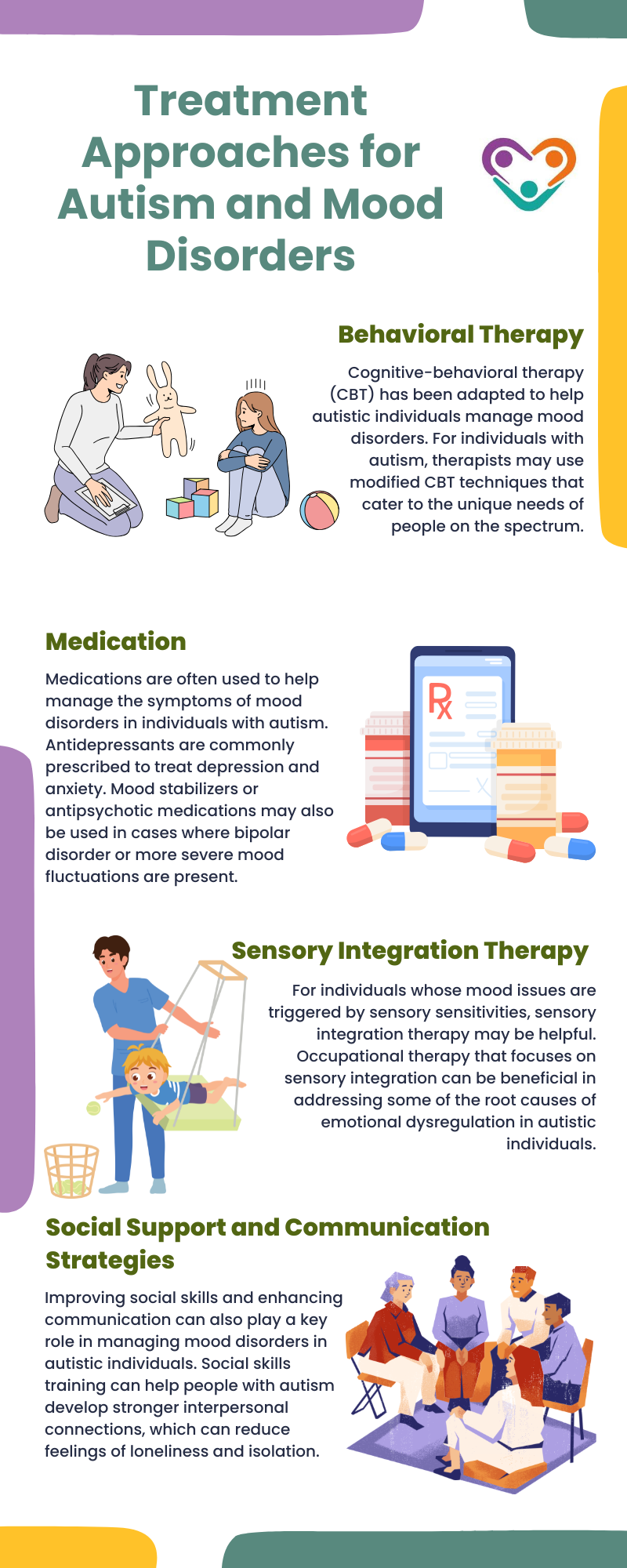
Table of Contents
Autism is a neurodevelopmental condition that affects individuals in many aspects of life, including social interactions, communication, and behavior. While autism primarily focuses on these areas, it is important to acknowledge that people with autism are also vulnerable to various mental health issues, including mood disorders.
The connection between autism and mood disorders is complex and multifaceted, with research indicating that individuals on the spectrum may be more prone to experiencing mood disturbances than their neurotypical peers.
We’re going to explore how mood disorders intersect with autism, offering a detailed examination of the symptoms, causes, and treatment options for those affected.
The Common Mood Disorders Associated with Autism
Autistic individuals are more likely to experience a range of mood disorders, the most common of which are depression, anxiety, and bipolar disorder. These conditions can often go undiagnosed or misdiagnosed, as their symptoms may overlap with those associated with autism itself.
Understanding the distinct characteristics of each disorder, as well as how they manifest in individuals on the spectrum, is crucial for accurate diagnosis and treatment.

Depression
Depression is a prevalent mood disorder in the autistic population, though it can sometimes be challenging to identify in individuals who have difficulty expressing emotions.
People with autism may not always display the typical signs of depression, such as sadness or hopelessness.
Instead, depression in autistic individuals can manifest through irritability, withdrawal from social situations, changes in behavior, or a marked decrease in interest in activities they once enjoyed.
For many autistic individuals, especially those with higher-functioning autism or Asperger’s syndrome, depression may become more apparent during adolescence or adulthood. This may be due to an increasing awareness of social difficulties, challenges in communication, and struggles with fitting in, which can trigger feelings of isolation and hopelessness.
Anxiety Disorders
Anxiety disorders are also highly prevalent among individuals with autism. This can include generalized anxiety, social anxiety, or specific phobias.
The heightened sensitivity to sensory stimuli and changes in routine that are often seen in autism can contribute to anxiety. Many people with autism feel overwhelmed by sensory overload or disruptions to their daily schedule.
Social anxiety is particularly common in autistic individuals because they often experience difficulty understanding social cues and expectations. The fear of making mistakes in social settings or being misunderstood can lead to feelings of extreme nervousness, self-consciousness, or avoidance of social interactions altogether.
Bipolar Disorder
Bipolar disorder is less commonly diagnosed in individuals with autism, but research suggests that the prevalence may be higher than in the general population. Extreme mood swings, including manic episodes and depressive episodes characterize it.
The symptoms of mania can be similar to behaviors sometimes seen in autistic individuals, such as hyperactivity or difficulty with emotional regulation.
However, unlike mood fluctuations in autism, manic episodes in bipolar disorder are typically more pronounced and can lead to more serious consequences.
How Autism and Mood Disorders Are Interconnected
A combination of genetic, neurological, and environmental factors shapes the relationship between autism and mood disorders. While there is no single cause that links autism to mood disorders, several factors contribute to this connection.
These are as follows:
Neurobiological Factors
Serotonin, which regulates mood, sleep, and appetite, is often found to be dysregulated in individuals with autism, and this dysregulation is also linked to conditions like depression and anxiety.
Additionally, differences in brain structure and function, such as abnormalities in the amygdala (which is responsible for emotional regulation), are thought to play a role in the development of mood disorders in autistic individuals. These neurobiological differences may make individuals with autism more susceptible to mood fluctuations and emotional difficulties.

Sensory Sensitivities and Routine Disruptions
Many people with autism experience sensory sensitivities, where everyday sounds, lights, textures, or smells can become overwhelming. This sensory overload can contribute to heightened anxiety and stress, particularly when the individual is in unfamiliar or uncontrolled environments.
The inability to manage sensory input effectively can trigger meltdowns or shutdowns, which are often signs of an underlying mood disturbance.
Routine and structure are vital for many individuals with autism, and any disruption in their predictable environment can lead to stress and feelings of insecurity.
For example, changes in daily routines, school transitions, or even a change in the weather can impact their emotional state. These disruptions can lead to mood swings or behaviors that may mimic symptoms of mood disorders.
Social Challenges and Isolation
Social difficulties are a core feature of autism, but these challenges can also contribute to the development of mood disorders. Difficulty in forming friendships, interpreting social cues, or engaging in reciprocal communication can result in feelings of rejection, loneliness, and isolation.
This social isolation can foster feelings of low self-esteem and depression, especially in individuals who are aware of their differences but unable to connect with others.
In addition, experiences of bullying and exclusion in school or social settings can exacerbate feelings of anxiety and depression. Autistic individuals, particularly those who are high-functioning, may struggle with self-acceptance as they become more aware of their social differences and challenges.
Treatment Approaches for Autism and Mood Disorders
Given the close link between autism and mood disorders, treatment must address both conditions in a comprehensive and integrated manner. Effective treatment plans often involve a combination of therapeutic interventions, medication, and lifestyle modifications to support mental health.
That said, here are some effective treatment approaches for autism and mood disorders:

Conclusion
The connection between autism and mood disorders is complex, and while the challenges are significant, there is hope for managing these conditions effectively.
Mood disorders such as depression, anxiety, and bipolar disorder are more common in individuals with autism, and these conditions often require specialized care and tailored treatments.
A multidisciplinary approach that includes behavioral therapy, medication, sensory integration strategies, and social support can help improve the quality of life for individuals affected by both autism and mood disorders.
Understanding the interplay between autism and mood disorders can help parents, caregivers, and professionals provide better support to individuals on the spectrum. At Golden Care Therapy, we offer specialized ABA therapy tailored to meet the unique needs of each individual.
Our expert team is dedicated to creating personalized strategies that foster emotional well-being and overall growth. If you’re seeking top-quality autism services in Georgia, don’t hesitate to reach out to us. We’re here to support you and your loved ones every step of the way. Contact us today to learn more about how we can help!
Sources:
- The Connection Between Autism and Mood Disorders - October 22, 2024
- Autistic Shutdown vs Depression: How They Differ - October 22, 2024
- Does ADHD Cause Procrastination? - October 22, 2024
